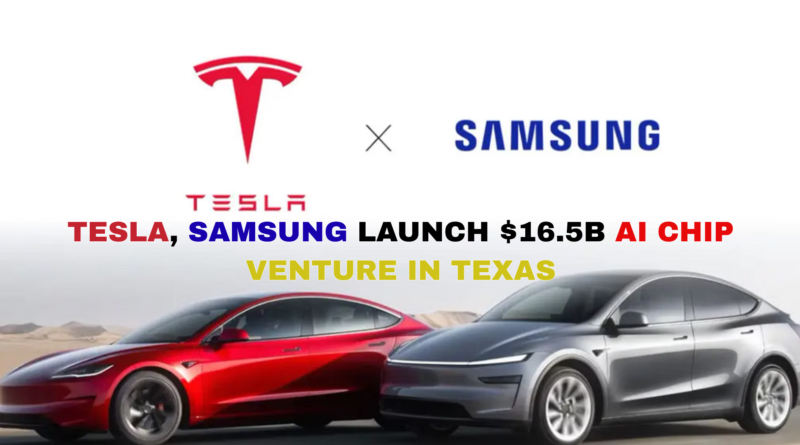TESLA AND SAMSUNG UNVEIL $16.5 BILLION AI CHIP PARTNERSHIP IN TEXAS
In a groundbreaking move set to reshape the global semiconductor landscape, Tesla and Samsung have announced a $16.5 billion collaboration to develop and manufacture a next-generation AI chip, dubbed “AI6.” This strategic venture marks one of the most significant tech alliances in recent years, bringing together Tesla’s software and AI expertise with Samsung’s world-leading semiconductor fabrication capabilities. The partnership is expected to fuel innovation in both the electric vehicle (EV) and consumer electronics sectors.
The “AI6” chip, the centerpiece of this collaboration, is being touted as a game-changing processor designed specifically for autonomous driving and deep learning workloads. According to insider reports, the chip will be based on Samsung’s cutting-edge 3nm process and is expected to dramatically improve Tesla’s Full Self-Driving (FSD) performance. Early projections suggest that AI6 could increase processing speeds by 50% while consuming 30% less power than current AI chips.
Production of the AI6 will take place at a newly announced facility in Austin, Texas. Tesla and Samsung jointly confirmed that this plant will become one of the most advanced semiconductor fabs in the United States. The facility will not only create over 6,000 direct jobs but is also expected to generate thousands of indirect jobs in the region, boosting Texas’s already growing reputation as a global technology hub.
This venture is also seen as a strategic response to the ongoing global chip supply challenges. By localizing production in the U.S., Tesla and Samsung aim to reduce dependency on East Asian supply chains and mitigate risks stemming from geopolitical tensions and shipping bottlenecks. The Texas plant will provide a steady supply of high-performance chips tailored specifically to Tesla’s evolving needs.
Industry analysts suggest this partnership could give Tesla a crucial edge over its competitors, especially in the race toward fully autonomous vehicles. While companies like Nvidia and Qualcomm have long dominated the automotive chip segment, Tesla’s vertical integration strategy, now reinforced by Samsung’s manufacturing power, could disrupt the current status quo. The AI6 chip is set to debut in Tesla’s next-generation Model X and Robotaxi platforms by late 2026.
For Samsung, the deal represents a major win in its bid to become a dominant player in AI-specific semiconductor manufacturing. Though the South Korean tech giant has long been a global leader in memory chips and consumer electronics, its foundry business has lagged behind Taiwan’s TSMC. The Tesla partnership offers Samsung a high-profile customer and the opportunity to prove its mettle in advanced chip fabrication.
Environmental sustainability has also been a key point of emphasis in this venture. Both Tesla and Samsung have pledged to power the Texas fab with renewable energy and implement state-of-the-art water recycling and emission control systems. The facility is expected to be one of the most eco-friendly chip plants in the world, aligning with the ESG goals of both companies and responding to growing shareholder demands for sustainability.
The U.S. government has expressed strong support for the venture, with the Biden administration reportedly offering substantial tax incentives and grants under the CHIPS and Science Act. Officials have praised the deal as a step forward in reclaiming America’s leadership in semiconductor manufacturing and reducing national security vulnerabilities tied to foreign chip dependencies.
As global demand for AI computing power continues to skyrocket, the Tesla–Samsung AI6 venture represents a forward-looking investment in the digital infrastructure of the future. With applications beyond EVs-ranging from smart factories to advanced robotics the AI6 chip could become a foundational component in the emerging AI-driven economy. This alliance not only cements the companies’ leadership in their respective sectors but also signals a new era of transnational collaboration in technology.




